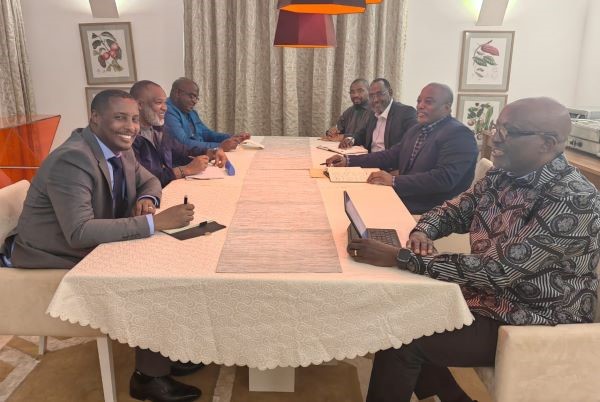In a highly symbolic political maneuver, former Congolese President Joseph Kabila made a dramatic appearance in Goma on Friday May 30, 2025 holding an open and widely publicized meeting with the leadership of the M23/AFC rebel alliance.
The engagement, unprecedented in its openness, signals a sharp turn in Kabila’s political trajectory and a potential new chapter in the Democratic Republic of Congo’s deepening crisis.
The meeting, confirmed by AFC coordinator Corneille Nangaa via social media platform X, was described as the “first of many discussions aimed at building sustainable peace, national cohesion, and true coexistence.”
Photographs from the event show Kabila walking alongside Nangaa and rebel commanders in M23-held territory, a clear sign of his direct engagement with the armed movement accused of destabilizing eastern DRC and designated a terrorist organization by Kinshasa.
Held inside rebel-controlled zones, the session is the clearest indication yet that Kabila is shedding legal caution in favor of open political alliance with insurgent forces.
His decision comes after months of mounting tensions with President Félix Tshisekedi’s administration, which recently stripped Kabila of his senatorial immunity, opening the door to possible prosecution for treason, war crimes, and crimes against humanity, charges linked to his alleged support for the M23/AFC coalition.
Defiant in the face of these legal threats, Kabila declared his commitment to “participate in the liberation of the country,” signaling a shift from courtroom defense to frontline political strategy.
One Kinshasa official remarked, “This meeting marks the moment Kabila has officially crossed the political Rubicon. What was once quiet backing is now an open alliance.”

Analysts interpret Kabila’s actions as an attempt to reassert his relevance on the national stage, positioning himself as a key negotiator in the conflict-ridden east.
By engaging with M23/AFC leadership under the banner of peace and reconciliation, he may be constructing a parallel power base, potentially challenging ongoing peace efforts backed by Kinshasa, the African Union, the United States, and Qatar.
His re-emergence, however, is already creating rifts beyond DRC borders. Sources indicate that Uganda’s President Yoweri Museveni recently blocked Kabila’s attempt to enter Goma via Uganda, wary of damaging Kampala’s military partnership with Kinshasa and jeopardizing a trade relationship with eastern Congo valued at over $530 million.
Museveni’s son, also Ugand’as CDF, General Muhoozi Kainerugaba, was less diplomatic, stating plainly, “I will never allow Joseph Kabila to become President of DRC again.”
Despite this opposition, Kabila reached Goma using alternative routes and now appears to be deepening his ties with rebel commanders.
The Kinshasa government has not formally responded, but internal sources suggest legal retaliation is imminent, including asset seizures and further criminal indictments.
As peace negotiations remain delicate and the region’s security hangs in the balance, Kabila’s overt alignment with the M23/AFC coalition threatens to reignite instability and raise the stakes in a conflict already marked by fragmentation and foreign interference.
His self-styled role as a peacemaker may instead usher in a more volatile era, where political legitimacy itself is under siege, both from within and beyond the borders of Kinshasa’s authority.

